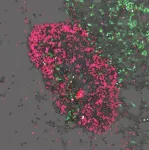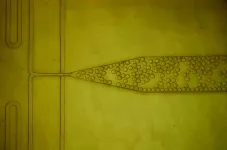Parental investment may have aided evolution of larger brains
New study explores evolution of larger brains in context of energy-intensive needs during growth
2023-02-28
(Press-News.org) A review of evidence from prior research provides new support for the possibility that the evolution of larger brains in some species was enabled through increased energy investment by parents in their offspring. Carel van Schaik of the Max Planck Institute for Animal Behavior in Konstanz, Germany, and colleagues present their arguments in a paper publishing February 28th in the open access journal PLOS Biology.
Between different species, larger relative brain size is associated with cognitive benefits that favor survival. However, larger brains come with higher energy costs. Prior research has examined these costs for adults in order to deepen understanding of evolutionary trends in brain size between different species. However, few studies have focused on the energy costs of the developing brain of young organisms.
To help fill that gap, van Schaik and colleagues addressed an apparent paradox: the larger a species’ brain, the more energy it requires during development—but large brains are not fully functional until well after they finish growing. This presents a “chicken-or-egg” or “bootstrapping” problem; most young offspring of larger-brained species should be unable to meet the energy demands of their own developing brains, raising the question of how larger brain size could have evolved.
The researchers hypothesize that warm-blooded species—which tend to have brains many times larger than cold-blooded species—evolved to have greater parental energy investment in their young, and this facilitated the evolution of larger brains.
To examine this possibility, the researchers reviewed evidence from prior studies on the evolution of parental energy investment in young offspring. Warm-blooded species invest energy in their young through such actions as producing eggs, lactating, providing food, carrying, or huddling to stay warm. Most cold-blooded species simply release eggs.
Detailed analyses showed that greater energy investment in young indeed evolved alongside the evolution of larger relative brain size, and that this greater investment also could have improved young offspring’s chances of survival.
These findings support the hypothesis that greater parental energy investment in young offspring facilitated the evolution of larger brains, and that the inability to provide that sustained energy in species that merely lay eggs, in turn, limited the evolution of larger brains. Future research could build on this study to shed further light on how larger brains evolved.
van Schaik adds, “The evolution of extended parental provisioning beyond the egg stage unblocked a major evolutionary constraint on brain size, and therefore unleashed a massive expansion of brain size and cognitive potential among warm-blooded birds and mammals. Almost all of them feed their young after birth or hatching and have much larger brains than their cold-blooded relatives.”
#####
In your coverage, please use this URL to provide access to the freely available paper in PLOS Biology: http://journals.plos.org/plosbiology/article?id=10.1371/journal.pbio.3002016
Citation: van Schaik CP, Song Z, Schuppli C, Drobniak SM, Heldstab SA, Griesser M (2023) Extended parental provisioning and variation in vertebrate brain sizes. PLoS Biol 21(2): e3002016. https://doi.org/10.1371/journal.pbio.3002016
Author Countries: Switzerland, Germany, Poland
Funding: This work was supported by the DFG (German Research Foundation) Heisenberg Grant No. 4650/2-1 to MG. The funders had no role in study design, data collection and analysis, decision to publish, or preparation of the manuscript.
END
ELSE PRESS RELEASES FROM THIS DATE:
2023-02-28
Multiple factors including a women’s age, marriage status, education and how many living children she has, are associated with pregnancy termination in low- and middle-income countries, according to a new study published this week in the open-access journal PLOS Global Public Health by Djibril Ba of Penn State College of Medicine, US, and colleagues.
In low- and middle-income countries (LMICs), a woman’s decision to terminate a pregnancy is often impacted by a patriarchal structure of society, restrictive abortion laws, cultural and religious beliefs and economic factors. About 45% ...
2023-02-28
An MUSC Hollings Cancer Center research team has created what team members believe to be among the first small molecules designed to stimulate immune cells to fight cancer. More importantly, these compounds inhibit a specific enzyme that hasn’t been targeted with small molecules for the treatment of cancer.
Small molecules are, quite literally, small. They’re hundreds of times smaller than monoclonal antibodies currently used in therapy, and they’re also structurally much simpler. Because of their low molecular mass, they are much more likely to enter cells. Aspirin, for example, is a small molecule ...
2023-02-28
People who became carers during Covid-19 by helping family members, friends or neighbours in need experienced a sharp decline in their own mental health, new research from Lancaster University reveals.
Using the General Health Questionnaire (GHQ) scale – a psychometrically validated and widely used index of psychological distress – researchers studied individual responses to the UK Household Longitudinal Study (Understanding Society).
They looked at 4698 participants from a total of 11 surveys - three before COVID-19 and eight collected between April 2020 ...
2023-02-28
Research by a team that includes two faculty members from the University of Colorado School of Medicine may change the treatment paradigm for patients with eosinophilic esophagitis (EoE), an allergic condition that causes chronic inflammation in the esophagus that can lead to esophageal narrowing and dysfunction.
Glenn Furuta, MD, professor of pediatric gastroenterology, hepatology, and nutrition, and Paul Menard-Katcher, MD, associate professor of gastroenterology, helped lead the National Institutes of Health (NIH)-funded, multisite study that shows that a single-food ...
2023-02-28
CAMBRIDGE, MA -- One of the most expensive steps in manufacturing protein drugs such as antibodies or insulin is the purification step: isolating the protein from the bioreactor used to produce it. This step can account for up to half of the total cost of manufacturing a protein.
In an effort to help reduce those costs, MIT engineers have devised a new way to perform this kind of purification. Their approach, which uses specialized nanoparticles to rapidly crystallize proteins, could help to make protein drugs more affordable and accessible, especially in developing ...
2023-02-28
INBRAIN Neuroelectronics, a Graphene Flagship spin-off company, has been named Spain’s most innovative company by leading Spanish news publication El Periódico.
INBRAIN exists to decode and modulate neural networks to improve patients’ lives. More specifically, INBRAIN is harnessing the unique properties of graphene to develop high density and high-resolution brain interfaces coupled to an intelligent system with high signal processing power to provide breakthrough neuroelectronic therapies.
The company was founded in 2020 by researchers from Graphene Flagship partner the Catalan Institute of Nanoscience ...
2023-02-28
DETROIT (February 28, 2023) – The Henry Ford Medical Group today announced Brien J. Smith, M.D., MBA, a national expert in neurology and epilepsy, as its new Chair of the Department of Neurology.
In this leadership role, Dr. Smith will oversee all clinical, research and administrative services for the Department of Neurology at Henry Ford Health. A veteran of Henry Ford, Dr. Smith was previously part of Henry Ford Hospital’s Neurology Department for 18 years, serving as Director of the Epilepsy Monitoring Unit, Medical Director of the Comprehensive Epilepsy Program, and Director of the Clinical Neurophysiology Program at Henry Ford Hospital in Detroit. He ...
2023-02-28
Images
Ankle exoskeletons that can help people extend their endurance are a step closer to reality with a new control algorithm, developed at the University of Michigan, that could enable future exoskeletons to automatically adapt to individual users and tasks. This would reduce or eliminate the need for manual recalibration.
Current exoskeletons are limited because they must be tailored to a single user performing a single task, like walking in a straight line. Any changes require a lengthy set ...
2023-02-28
ROCHESTER, Minn. — Being overweight impacts your heart health in more ways than you might think. A new JACC review paper from Mayo Clinic outlines how obesity affects the common tests used to diagnose heart disease and impacts treatments. Cardiovascular disease is the leading cause of death in the U.S. and globally, yet it is largely preventable.
"Excess fat acts as a kind of filter and can skew test readings to under-or overdiagnosis," says senior author Francisco Lopez-Jimenez, M.D., director of preventive cardiology at Mayo Clinic. "Obesity affects ...
2023-02-28
CHICAGO — Feb. 28, 2023 — Today, millions of individuals across the world live with limb loss, including thousands of combat-injured service men and women. Although significant progress has been made in the durability, control and function of prosthetic devices, they lack complete integration into the body.
Now, with the award of a $1.5 million grant from the Department of Defense Congressionally Directed Medical Research Program (CDMRP), Shirley Ryan AbilityLab — the top-ranked physical medicine and rehabilitation hospital — ...
LAST 30 PRESS RELEASES:
[Press-News.org] Parental investment may have aided evolution of larger brains
New study explores evolution of larger brains in context of energy-intensive needs during growth



